Researchers of the Month
May 2024
Here are just some of the graduating seniors we will miss. ... We wish them all well with their future endeavors and pursuits!
CME TEAM members Daniel Arnoldi, Michael Harris and Eliana Matsil are all Chemical and Molecular Engineering (CME) majors, and part of a CME team working
with the Shinnecock tribe to set up a 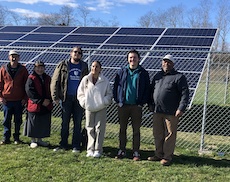 renewable hydrogen based micro-grid for powering the Ayeu Transitional Housing Complex
for tribal members requiring temporary shelter.
renewable hydrogen based micro-grid for powering the Ayeu Transitional Housing Complex
for tribal members requiring temporary shelter.
Photo (right): The students are here pictured with Phil Brown (Shinnecock director
of housing), Wayne Gutshow, the electrical engineer who is helping with installation
of power monitoring devices and Dr. Rafailovich (CME mentor). The project is funded
by the Office of Naval Research PI: Yacov Shamash
* Daniel Arnoldi is a senior graduating with a specialization in material science who plans to continue
his education by pursuing a PhD at Stony Brook working with Professor Dennis Lee (Materials
Science & Chemical Engineering). Daniel conducted research for two semesters in Professor
Tae Jin Kim's lab and working to examine fabric deweaving for recycling, before joining
The Shinnecock Energy project during his senior year. He is an Eagle Scout and has
a great passion for research in the field of the transformation, use, and capture
of energy, and hopes to continue his research into Metal-Organic Frameworks during
his PhD. studies.
Daniel Arnoldi is a senior graduating with a specialization in material science who plans to continue
his education by pursuing a PhD at Stony Brook working with Professor Dennis Lee (Materials
Science & Chemical Engineering). Daniel conducted research for two semesters in Professor
Tae Jin Kim's lab and working to examine fabric deweaving for recycling, before joining
The Shinnecock Energy project during his senior year. He is an Eagle Scout and has
a great passion for research in the field of the transformation, use, and capture
of energy, and hopes to continue his research into Metal-Organic Frameworks during
his PhD. studies.
* Michael Harris is a graduating CME major with a particular interest in renewable energy. He has
previously worked with a Long Island based solar power company and continued this
interest by working with the Shinnecock Nation to help research a renewable and off-the-grid
system. Michael is entering the workforce and plans on continuing to pursue his interest
in renewable energy on Long Island. *Eliana Matsil is a senior in CME with a specialization in Business. She spent Summer 2023 in Dr.
Devinder Mahajan's lab at the Advanced Energy Center (AERTC) observing the absorption/desorption
kinetics and thermodynamics of reactions associated with a solid mischmetal hydrogen
storage technology. Her most prominent interest in her field is renewable energy,
specifically exploring solar-to-hydrogen energy systems. Eliana will be continuing
to help Shinnecock Nation establish a sustainable microgrid in Fall 2024 as she pursues
her masters in CME.
*Eliana Matsil is a senior in CME with a specialization in Business. She spent Summer 2023 in Dr.
Devinder Mahajan's lab at the Advanced Energy Center (AERTC) observing the absorption/desorption
kinetics and thermodynamics of reactions associated with a solid mischmetal hydrogen
storage technology. Her most prominent interest in her field is renewable energy,
specifically exploring solar-to-hydrogen energy systems. Eliana will be continuing
to help Shinnecock Nation establish a sustainable microgrid in Fall 2024 as she pursues
her masters in CME.
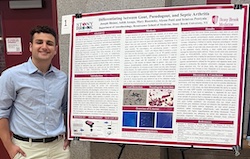 Joe Bisiani is a physics major and chemistry minor in the Honors College who has been dong research
under the mentorship of Dr. Srinivas Pentyala for the last two years. Joe first got
interested in research after meeting Dr. Pentyala as a high school participant in
the Science and Research Awareness Series (SARAS) Program. He credits the program with inspiring him to pursue medicine, and
has assisted in running the program in recent summers. Joe's research involves creating
a rapid detection kit for different types of inflammatory arthritis, such as gout,
pseudogout, and septic arthritis. He also has been published as a primary author on
a paper which delves into the intersectionality between quantum physics and medicine.
Joe participated in the URECA program for two years, presented his research at the
2023 Department of Anesthesiology's Annual Research Symposium, and was selected to
be a final panelist for 2024 Department of Anesthesiology's Annual Research Symposium,
where he will be presenting his final findings on his rapid detection kit research
to physicians in the field. Joe was recognized recently with the SUNY Chancellor's
award for Student Excellence, and will be attending medical school this upcoming fall.
Joe Bisiani is a physics major and chemistry minor in the Honors College who has been dong research
under the mentorship of Dr. Srinivas Pentyala for the last two years. Joe first got
interested in research after meeting Dr. Pentyala as a high school participant in
the Science and Research Awareness Series (SARAS) Program. He credits the program with inspiring him to pursue medicine, and
has assisted in running the program in recent summers. Joe's research involves creating
a rapid detection kit for different types of inflammatory arthritis, such as gout,
pseudogout, and septic arthritis. He also has been published as a primary author on
a paper which delves into the intersectionality between quantum physics and medicine.
Joe participated in the URECA program for two years, presented his research at the
2023 Department of Anesthesiology's Annual Research Symposium, and was selected to
be a final panelist for 2024 Department of Anesthesiology's Annual Research Symposium,
where he will be presenting his final findings on his rapid detection kit research
to physicians in the field. Joe was recognized recently with the SUNY Chancellor's
award for Student Excellence, and will be attending medical school this upcoming fall.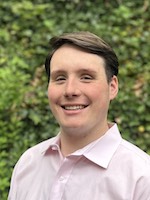 Michael Corcoran is a history major and music minor in the Honors College, in the BA/MAT Social Studies
Teacher Preparation Program. His research on cult psychology and propaganda, written
for his HIS 301 class with Dr. Nancy Tomes, was published in the Fall 2022 volume
of the Stony Brook University Undergraduate History Journal. For his Honors College
senior thesis, written under the supervision of Dr. Richard Tomczak, Michael focused
on correcting two misconceptions about the Revolutionary War in New York City and
Long Island: that there was a clear divide between “Patriot” and “Loyalist,” and that
there was a lack of revolutionary action in New York. Through the stories of how ordinary
people interacted with larger revolutionary currents, Michael attempted to craft a
more complete picture of the Revolution in New York. This coming academic year, Michael
will be student teaching and finishing his master's degree.
Michael Corcoran is a history major and music minor in the Honors College, in the BA/MAT Social Studies
Teacher Preparation Program. His research on cult psychology and propaganda, written
for his HIS 301 class with Dr. Nancy Tomes, was published in the Fall 2022 volume
of the Stony Brook University Undergraduate History Journal. For his Honors College
senior thesis, written under the supervision of Dr. Richard Tomczak, Michael focused
on correcting two misconceptions about the Revolutionary War in New York City and
Long Island: that there was a clear divide between “Patriot” and “Loyalist,” and that
there was a lack of revolutionary action in New York. Through the stories of how ordinary
people interacted with larger revolutionary currents, Michael attempted to craft a
more complete picture of the Revolution in New York. This coming academic year, Michael
will be student teaching and finishing his master's degree.
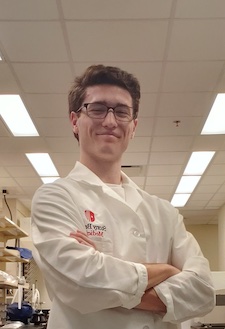 Thomas A. Brinkley is a Biology major specializing in Developmental Genetics and a member of the University
Scholars honors program. He joined the Moll Lab in the Department of Pathology at
the Stony Brook Cancer Center in June 2022, investigating the role of a novel cell
cycle protein on the differentiation of multiciliated cells (MCCs). Working under
the guidance of Alice Nemajerova, Ph.D., and doctoral candidate William Brett, Thomas
learned valuable techniques to further describe and define the transcriptional profile
of MCCs. In particular, he learned R and Python to apply novel computational methods
to single-cell RNA-sequencing analysis and has identified several candidate genes
implicated in this process. He recently presented his findings at the 2024 URECA symposium
and is excited to continue his research as a full-time Research Support Specialist
after graduation. Outside of research, Thomas has spent the past year as a Teaching
Assistant for several upper-division courses in Undergraduate Biology. He also enjoys
playing soccer, both as a member of the Men's Club Soccer team and volunteering with
TOPSoccer, which provides children with disabilities an opportunity to play soccer
in a structured environment. After graduating, Thomas will matriculate into a Master's
program in Bioinformatics at Johns Hopkins University.
Thomas A. Brinkley is a Biology major specializing in Developmental Genetics and a member of the University
Scholars honors program. He joined the Moll Lab in the Department of Pathology at
the Stony Brook Cancer Center in June 2022, investigating the role of a novel cell
cycle protein on the differentiation of multiciliated cells (MCCs). Working under
the guidance of Alice Nemajerova, Ph.D., and doctoral candidate William Brett, Thomas
learned valuable techniques to further describe and define the transcriptional profile
of MCCs. In particular, he learned R and Python to apply novel computational methods
to single-cell RNA-sequencing analysis and has identified several candidate genes
implicated in this process. He recently presented his findings at the 2024 URECA symposium
and is excited to continue his research as a full-time Research Support Specialist
after graduation. Outside of research, Thomas has spent the past year as a Teaching
Assistant for several upper-division courses in Undergraduate Biology. He also enjoys
playing soccer, both as a member of the Men's Club Soccer team and volunteering with
TOPSoccer, which provides children with disabilities an opportunity to play soccer
in a structured environment. After graduating, Thomas will matriculate into a Master's
program in Bioinformatics at Johns Hopkins University.
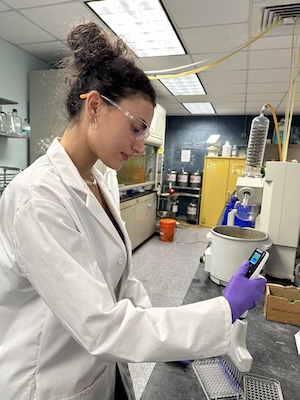
Francesca DelloRusso is a Biology Major with a Chemistry Minor. She was awarded the Frances Velay Women
and Science Research Fellowship for summer 2022 to support full time researchin the
laboratory of Dr. Peter Tonge. Her primary focus has been the synthesis of compounds
to generate a Structure-Kinetic Relationship for inhibition of Bruton's TyrosineKinase
(BTK), a target for the treatment of lymphomas and leukemias. As an undergraduate
researcher, Francesca has presented posters at the annual URECA symposiums as well
as Chemistry Research Day symposia. She is a mentor and volunteer for the Brooklyn
Blacksmiths, Xaverian High School’s Robotics team, a volunteer for Crisis Text Line,
and a Medical Scribe in the Emergency Department. Following graduation, Francesca
aspires to attend medical school and become an Anesthesiologist.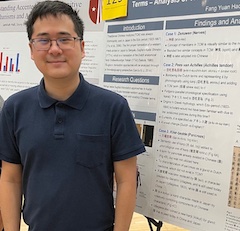 Fang Yuan Hao is a biology major with a specialization in Interdisciplinary Biology, and a minor
in music. His biology research experience began in high school, when he worked in
Dr. Donald Scott’s laboratory at the Diabetes, Obesity and Metabolism Institute at
Mount Sinai Hospital studying the role of carbohydrate response-element binding protein
(ChREBP) in the regeneration of pancreatic beta cells. At Stony Brook, he worked in
Dr. Nancy Reich’s laboratory at the Department of Microbiology and Immunology studying
the role of signal transducer and activators of transcription (STATs) in pancreatic
cancers. In 2023, he began learning Japanese, and reached advanced level proficiency
within one year through intensive course-study and additional self-study. Under the
guidance of Dr. Eriko Sato, Fang Yuan analyzed historical medical documents using
his understanding of Japanese, and researched the sociohistorical development of Japanese
anatomical terms — a topic that lies in the intersection between biology, Japanese,
translation studies, and translanguaging. He was one of 3 students to be selected
for the "Best MIC-URECA Poster Presentation Award" at the recent URECA Symposium. He intends to pursue a career in medicine in the future and hopes to become a doctor
who is sensitive to the human aspects of medicine.
Fang Yuan Hao is a biology major with a specialization in Interdisciplinary Biology, and a minor
in music. His biology research experience began in high school, when he worked in
Dr. Donald Scott’s laboratory at the Diabetes, Obesity and Metabolism Institute at
Mount Sinai Hospital studying the role of carbohydrate response-element binding protein
(ChREBP) in the regeneration of pancreatic beta cells. At Stony Brook, he worked in
Dr. Nancy Reich’s laboratory at the Department of Microbiology and Immunology studying
the role of signal transducer and activators of transcription (STATs) in pancreatic
cancers. In 2023, he began learning Japanese, and reached advanced level proficiency
within one year through intensive course-study and additional self-study. Under the
guidance of Dr. Eriko Sato, Fang Yuan analyzed historical medical documents using
his understanding of Japanese, and researched the sociohistorical development of Japanese
anatomical terms — a topic that lies in the intersection between biology, Japanese,
translation studies, and translanguaging. He was one of 3 students to be selected
for the "Best MIC-URECA Poster Presentation Award" at the recent URECA Symposium. He intends to pursue a career in medicine in the future and hopes to become a doctor
who is sensitive to the human aspects of medicine.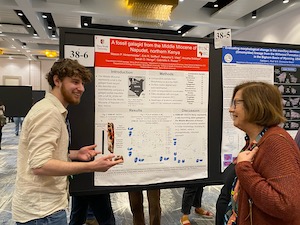 Mason Hintermeister is a Human Evolutionary Biology & Anthropology double major. Since his freshman year,
he has worked to quantify dental and mandibular variation in primates across time
as part of Dr. Gabrielle Russo's Lab. This year, he presented a description and analysis
of a 13.3 million year old fossil galago from Kenya at the Annual Meeting of the American
Association of Biological Anthropology in Los Angeles, California, the Northeast Vertebrate
Paleontology Symposium in Manhattan, New York, and at the URECA symposium. Additionally,
Mason is an intern on the Fossil Sharks and AI project at the Thompson Earth Systems
Institute developing crowd-sourced fossil shark tooth identification models for use
as K-12 computer science education materials. He has served as the vice president
of the Stony Brook Undergraduate Anthropology Society (UAS) for almost 2 years. After
graduation, Mason will continue his research of fossil primate teeth through a PhD
at the Johns Hopkins School of Medicine's Center for Functional Anatomy & Evolution
under Dr. Siobhán Cooke.
Mason Hintermeister is a Human Evolutionary Biology & Anthropology double major. Since his freshman year,
he has worked to quantify dental and mandibular variation in primates across time
as part of Dr. Gabrielle Russo's Lab. This year, he presented a description and analysis
of a 13.3 million year old fossil galago from Kenya at the Annual Meeting of the American
Association of Biological Anthropology in Los Angeles, California, the Northeast Vertebrate
Paleontology Symposium in Manhattan, New York, and at the URECA symposium. Additionally,
Mason is an intern on the Fossil Sharks and AI project at the Thompson Earth Systems
Institute developing crowd-sourced fossil shark tooth identification models for use
as K-12 computer science education materials. He has served as the vice president
of the Stony Brook Undergraduate Anthropology Society (UAS) for almost 2 years. After
graduation, Mason will continue his research of fossil primate teeth through a PhD
at the Johns Hopkins School of Medicine's Center for Functional Anatomy & Evolution
under Dr. Siobhán Cooke.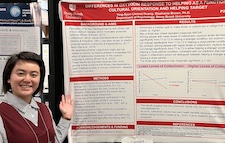 Ying-Syun (Jenna) Huang is a Psychology and Business Management double major and is in the Psychology Honors
Program. She worked with Dr. Stephanie Brown and Dr. Anne Moyer for her Honors thesis,
titled “Differences in Oxytocin Response to Helping as a Function of Cultural Orientation
and Helping Target,” and did a poster presentation for the Honors project at the Social
and Affective Neuroscience Society (SANS) 2024 conference and at the Stony Brook University
2024 URECA Celebration. Her Honors project examined how people’s levels of collectivism
influence their oxytocin response to helping a stranger versus helping a close partner.
While working with Dr. Stephanie Brown, she also co-authored a commentary titled “Creating
Shared Goals and Experiences as a Pathway to Peace,” which has been published in Behavioral
and Brain Sciences. In addition, she has been working as a research assistant in Dr.
Sheri Levy’s Prejudice and Intergroup Relations Laboratory since Fall 2022, and she
is currently co-authoring a manuscript examining the effectiveness of aging education
in reducing ageism as well as another manuscript investigating whether and how health
and physical education teachers in public middle and high schools across the U.S.
teach about aging across the lifespan. Furthermore, she has been working as a research
assistant in Dr. Brady Nelson’s Laboratory for Clinical Affective Neuroscience since
Fall 2023 and assisting with a project that aims to investigate people’s psychoneuroimmunological
reactivity to unpredictable threat. She is a recipient of the 2024 Provost’s Award
for Academic Excellence. After graduation, she will be pursuing a PhD in Experimental
Psychology at Oklahoma State University in Fall 2024.
Ying-Syun (Jenna) Huang is a Psychology and Business Management double major and is in the Psychology Honors
Program. She worked with Dr. Stephanie Brown and Dr. Anne Moyer for her Honors thesis,
titled “Differences in Oxytocin Response to Helping as a Function of Cultural Orientation
and Helping Target,” and did a poster presentation for the Honors project at the Social
and Affective Neuroscience Society (SANS) 2024 conference and at the Stony Brook University
2024 URECA Celebration. Her Honors project examined how people’s levels of collectivism
influence their oxytocin response to helping a stranger versus helping a close partner.
While working with Dr. Stephanie Brown, she also co-authored a commentary titled “Creating
Shared Goals and Experiences as a Pathway to Peace,” which has been published in Behavioral
and Brain Sciences. In addition, she has been working as a research assistant in Dr.
Sheri Levy’s Prejudice and Intergroup Relations Laboratory since Fall 2022, and she
is currently co-authoring a manuscript examining the effectiveness of aging education
in reducing ageism as well as another manuscript investigating whether and how health
and physical education teachers in public middle and high schools across the U.S.
teach about aging across the lifespan. Furthermore, she has been working as a research
assistant in Dr. Brady Nelson’s Laboratory for Clinical Affective Neuroscience since
Fall 2023 and assisting with a project that aims to investigate people’s psychoneuroimmunological
reactivity to unpredictable threat. She is a recipient of the 2024 Provost’s Award
for Academic Excellence. After graduation, she will be pursuing a PhD in Experimental
Psychology at Oklahoma State University in Fall 2024.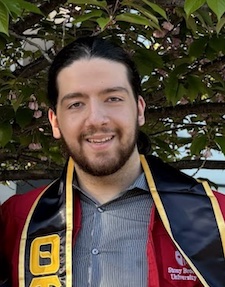 Andreas Kaimis is a Biomedical Engineering student specializing in Molecular and Cellular Biomedical
Engineering. Under Dr. Ete Chan and graduate student Christopher Ashdown’s mentorship,
Andreas has led multiple teams within the Vertically Integrated Project group BEAR—Bioengineering
Education, Application and Research. The Chan Lab seeks to explore the effects of
Low Intensity Vibration (LIV) on various cell types and improve the biomanufacturing
process for the cancer treatment, CAR T-cell immunotherapy. Since joining Chan Lab
in the summer of 2023, Andreas has rapidly developed skills in both electrical engineering
and wet lab techniques, contributing to various interdisciplinary projects. In spring
2024, he presented four posters at URECA, showcasing his leadership in LIV device
development within BEAR, creation of a custom measurement protocol for a LIV mouse
model, his role in a collaborative bone organoid study, and his ongoing efforts to
refine western blot protocols to study T-cell proliferation under LIV. This fall,
Andreas will continue his studies in the accelerated Biomedical Engineering Masters
program here at Stony Brook. He is a recipient of the Provost's award for Academic
Excellence.
Andreas Kaimis is a Biomedical Engineering student specializing in Molecular and Cellular Biomedical
Engineering. Under Dr. Ete Chan and graduate student Christopher Ashdown’s mentorship,
Andreas has led multiple teams within the Vertically Integrated Project group BEAR—Bioengineering
Education, Application and Research. The Chan Lab seeks to explore the effects of
Low Intensity Vibration (LIV) on various cell types and improve the biomanufacturing
process for the cancer treatment, CAR T-cell immunotherapy. Since joining Chan Lab
in the summer of 2023, Andreas has rapidly developed skills in both electrical engineering
and wet lab techniques, contributing to various interdisciplinary projects. In spring
2024, he presented four posters at URECA, showcasing his leadership in LIV device
development within BEAR, creation of a custom measurement protocol for a LIV mouse
model, his role in a collaborative bone organoid study, and his ongoing efforts to
refine western blot protocols to study T-cell proliferation under LIV. This fall,
Andreas will continue his studies in the accelerated Biomedical Engineering Masters
program here at Stony Brook. He is a recipient of the Provost's award for Academic
Excellence.
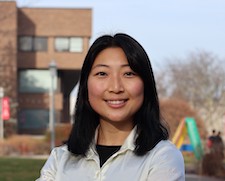 Carsi Kim is a Biomedical Engineering major with a diverse research background. She began her
research during her sophomore year in the Vertically Integrated Projects under Dr.
Mei Lin Chan, working on LIPSYNC, a mouth-controlled input device for quadriplegics,
in collaboration with Dr. Brooke Ellison. Her focus shifted to tissue-engineered kidneys
under Dr. David Rubenstein, where she worked on bioprinting projects like unobtrusive
flow chambers and kidney-on-a-chip models, eventually advancing to a leadership position
and winning the “Best Multidisciplinary Team” award at URECA. Additionally, her senior
design project, “A Device to Quantify Non-Nutritive Infant Sucking Force,” was presented
at URECA and the Northeastern Bioengineering Conference (NEBEC), where it received
an honorable mention. Beyond these projects, Carsi is also involved in a biomedical
optical imaging lab led by Dr. Ulas Sunar, focusing on functional and molecular optical
imaging techniques for early disease detection and intervention After graduation,
Carsi will be pursuing a PhD in Biomedical Engineering at Stony Brook University.
Carsi Kim is a Biomedical Engineering major with a diverse research background. She began her
research during her sophomore year in the Vertically Integrated Projects under Dr.
Mei Lin Chan, working on LIPSYNC, a mouth-controlled input device for quadriplegics,
in collaboration with Dr. Brooke Ellison. Her focus shifted to tissue-engineered kidneys
under Dr. David Rubenstein, where she worked on bioprinting projects like unobtrusive
flow chambers and kidney-on-a-chip models, eventually advancing to a leadership position
and winning the “Best Multidisciplinary Team” award at URECA. Additionally, her senior
design project, “A Device to Quantify Non-Nutritive Infant Sucking Force,” was presented
at URECA and the Northeastern Bioengineering Conference (NEBEC), where it received
an honorable mention. Beyond these projects, Carsi is also involved in a biomedical
optical imaging lab led by Dr. Ulas Sunar, focusing on functional and molecular optical
imaging techniques for early disease detection and intervention After graduation,
Carsi will be pursuing a PhD in Biomedical Engineering at Stony Brook University.
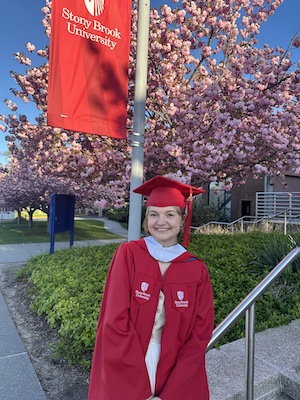 Gwendolyn Loubier is a Psychology and Women’s, Gender and Sexuality studies major who plans to pursue
a career in Social Work. Gwen began her research early in 2023 in her Senior Seminar
class under the mentorship of Professor Liz Montegary, and studied the current mental
healthcare approaches of counselors treating queer clients experiencing religious
trauma in the context of evangelical institutions and rhetoric in the U.S. Her research
involves analysis of the music and media which queer young adults tend to gravitate
towards when the subject matter is heavily inspired by themes of religious trauma
from the queer perspective, and she hopes to broaden the approaches of counselors
and criticize the greater harms of evangelical institutions. She presented "How Queer Young Adults Cope with Religious Trauma" at the URECA 2024 poster symposium. She also works in Dr. Christian Luhmann’s Lab
assisting Alexandra Ortmann’s Social Inferences trials. Outside of her research, Gwen
leads the Humanology Project organization on campus, contributing to the destigmatization
of mental illness in her community.
Gwendolyn Loubier is a Psychology and Women’s, Gender and Sexuality studies major who plans to pursue
a career in Social Work. Gwen began her research early in 2023 in her Senior Seminar
class under the mentorship of Professor Liz Montegary, and studied the current mental
healthcare approaches of counselors treating queer clients experiencing religious
trauma in the context of evangelical institutions and rhetoric in the U.S. Her research
involves analysis of the music and media which queer young adults tend to gravitate
towards when the subject matter is heavily inspired by themes of religious trauma
from the queer perspective, and she hopes to broaden the approaches of counselors
and criticize the greater harms of evangelical institutions. She presented "How Queer Young Adults Cope with Religious Trauma" at the URECA 2024 poster symposium. She also works in Dr. Christian Luhmann’s Lab
assisting Alexandra Ortmann’s Social Inferences trials. Outside of her research, Gwen
leads the Humanology Project organization on campus, contributing to the destigmatization
of mental illness in her community.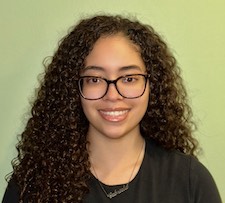 Gabriela Montanez is a Psychology major with a specialization in Sociology. As a freshman in college,
she began doing research at the Biology Education Research Lab (BERL) under the supervision
of Dr. Ross Nehm and Dr. Gena Sbeglia in the Department of Ecology & Evolution. At
BERL, she collaborated with biology faculty and undergraduate research assistants
on a research project focused on uncovering and mitigating barriers to ecology and
evolution career pursuits experienced by racially minoritized students in gateway
biology courses. Outside of research, she is a volunteer at the Self-Initiated Living
Options (SILO) within the Advocacy Department. Her dedication to diversity, equity,
and inclusion is evident in her research endeavors and volunteer work, reflecting
her ongoing commitment to these principles. She will continue her studies at Stony
Brook University this summer in the MA Psychology program.
Gabriela Montanez is a Psychology major with a specialization in Sociology. As a freshman in college,
she began doing research at the Biology Education Research Lab (BERL) under the supervision
of Dr. Ross Nehm and Dr. Gena Sbeglia in the Department of Ecology & Evolution. At
BERL, she collaborated with biology faculty and undergraduate research assistants
on a research project focused on uncovering and mitigating barriers to ecology and
evolution career pursuits experienced by racially minoritized students in gateway
biology courses. Outside of research, she is a volunteer at the Self-Initiated Living
Options (SILO) within the Advocacy Department. Her dedication to diversity, equity,
and inclusion is evident in her research endeavors and volunteer work, reflecting
her ongoing commitment to these principles. She will continue her studies at Stony
Brook University this summer in the MA Psychology program. 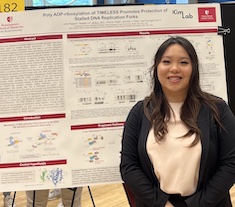 Amy Phi is a biology major in the WISE Honors program. In her freshman year, she began studying
DNA Repair pathways in cancer cells under the supervision of Dr. Hyungjin Kim in the
Department of Pharmacology at Renaissance School of Medicine. In her sophomore year,
she participated in the URECA program to investigate the function of HPF1 in replication
fork repair mechanisms. Subsequently, during her junior and senior year, she continued
her exploration by examining the role of another important DNA repair protein, Replication
Protein A. Amy worked on this project in summer 2023 with the support of the Frances
Velay Fellowship. Amy is an active member of Taiwanese Students Association and an
EMT for East Setauket Fire Department.
Amy Phi is a biology major in the WISE Honors program. In her freshman year, she began studying
DNA Repair pathways in cancer cells under the supervision of Dr. Hyungjin Kim in the
Department of Pharmacology at Renaissance School of Medicine. In her sophomore year,
she participated in the URECA program to investigate the function of HPF1 in replication
fork repair mechanisms. Subsequently, during her junior and senior year, she continued
her exploration by examining the role of another important DNA repair protein, Replication
Protein A. Amy worked on this project in summer 2023 with the support of the Frances
Velay Fellowship. Amy is an active member of Taiwanese Students Association and an
EMT for East Setauket Fire Department.
After graduation, she plans to pursue a career in medicine.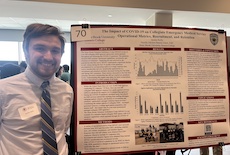 Jayden Reilly is a student in the Honors College, majoring in Applied Math, and Biology (with a
specialization in quantitative biology and bioinformatics). In his sophomore year
at Stony Brook, he began his involvement in research by joining the Integrating Population
Health Informations Vertically Integrated Project (VIP) Team where he studied the
social determinants of mental health and the availability of public mental health
resources in Suffolk County. During the following summer, he was a member of Stony
Brook's 2023 iGEM Team, responsible for several of the dry lab components of their
synthetic biology project which was presented at the 2023 URECA Summer Symposium.
Most recently, Jayden completed his Honors College Senior Thesis studying the impact
that the COVID-19 pandemic had on collegiate EMS operations. Outside of research,
Jayden volunteers with the Stony Brook Volunteer Ambulance Corps as an EMT and works
as a lifeguard and swim coach. He will be applying to medical school after graduation.
Jayden Reilly is a student in the Honors College, majoring in Applied Math, and Biology (with a
specialization in quantitative biology and bioinformatics). In his sophomore year
at Stony Brook, he began his involvement in research by joining the Integrating Population
Health Informations Vertically Integrated Project (VIP) Team where he studied the
social determinants of mental health and the availability of public mental health
resources in Suffolk County. During the following summer, he was a member of Stony
Brook's 2023 iGEM Team, responsible for several of the dry lab components of their
synthetic biology project which was presented at the 2023 URECA Summer Symposium.
Most recently, Jayden completed his Honors College Senior Thesis studying the impact
that the COVID-19 pandemic had on collegiate EMS operations. Outside of research,
Jayden volunteers with the Stony Brook Volunteer Ambulance Corps as an EMT and works
as a lifeguard and swim coach. He will be applying to medical school after graduation.
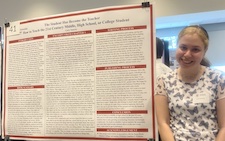 Carly Santore is a Mathematics and Applied Mathematics & Statistics double major in the Honors
College; and is in the Masters in Teaching Mathematics 5-year program. She has spent
the last 12 months writing and editing a 163-page book, tentatively titled “The Student Has Become the Teacher: How to Teach the How to Teach the 21st Century
Middle, High School, or College Student.” She wrote the book from the perspective of a pre-, mid- and post-pandemic student
and survivor of the American school system. In it, she tackles the unglamorous parts
of the teenage experience such as alcohol and vaping, suicidal ideation, body shaming,
social media and Internet addiction, identity struggles, and Artificial Intelligence,
among other things. Carly describes her tone as informal and personal, raw and edgy,
positive and confident with the hopes of strongly resonating with the audience through
wit and joviality, rather than being strictly professional and informational; and
views her book as a call to reassess age-old teaching methods and provide future generations
with tools they can thrive with, by someone who was just there, on the frontlines.
She recently presented a poster on her work at the 2024 Honors College Senior Thesis
Symposium. Carly looks forward to pursuing a career as a middle or high school mathematics
teacher.
Carly Santore is a Mathematics and Applied Mathematics & Statistics double major in the Honors
College; and is in the Masters in Teaching Mathematics 5-year program. She has spent
the last 12 months writing and editing a 163-page book, tentatively titled “The Student Has Become the Teacher: How to Teach the How to Teach the 21st Century
Middle, High School, or College Student.” She wrote the book from the perspective of a pre-, mid- and post-pandemic student
and survivor of the American school system. In it, she tackles the unglamorous parts
of the teenage experience such as alcohol and vaping, suicidal ideation, body shaming,
social media and Internet addiction, identity struggles, and Artificial Intelligence,
among other things. Carly describes her tone as informal and personal, raw and edgy,
positive and confident with the hopes of strongly resonating with the audience through
wit and joviality, rather than being strictly professional and informational; and
views her book as a call to reassess age-old teaching methods and provide future generations
with tools they can thrive with, by someone who was just there, on the frontlines.
She recently presented a poster on her work at the 2024 Honors College Senior Thesis
Symposium. Carly looks forward to pursuing a career as a middle or high school mathematics
teacher.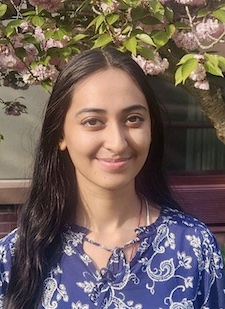 Juhi Sarin is a Biology major (with an Interdisciplinary Biology specialization); and is completing
an Asian & Asian American Studies minor with a concentration in region and language.
Juhi has spent time volunteering at Stony Brook Hospital and working in the Regional
Perinatal Center. She enjoys learning about different cultures in order to be a more
effective communicator and prepare for a future in serving the community as a healthcare
provider. This year Juhi conducted research exploring cross-cultural moral lessons
and cultural retention amongst South Asian Americans through classic children’s literature
and presented her findings at the URECA Symposium as well as the Asian and Asian American
Studies Symposium. She was one of 3 students to be selected for the "Best MIC-URECA Poster Presentation Award." After graduation, Juhi will be applying to medical school and pursuing a career in
medicine while continuing to enrich herself.
Juhi Sarin is a Biology major (with an Interdisciplinary Biology specialization); and is completing
an Asian & Asian American Studies minor with a concentration in region and language.
Juhi has spent time volunteering at Stony Brook Hospital and working in the Regional
Perinatal Center. She enjoys learning about different cultures in order to be a more
effective communicator and prepare for a future in serving the community as a healthcare
provider. This year Juhi conducted research exploring cross-cultural moral lessons
and cultural retention amongst South Asian Americans through classic children’s literature
and presented her findings at the URECA Symposium as well as the Asian and Asian American
Studies Symposium. She was one of 3 students to be selected for the "Best MIC-URECA Poster Presentation Award." After graduation, Juhi will be applying to medical school and pursuing a career in
medicine while continuing to enrich herself.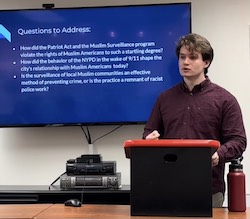 Carmine Scricco, an English and History double major with a minor in Music Theory, was inspired by
his friend Fardeen, a resident of Brooklyn, to explore Muslim American Surveillance
in Post 9/11 New York City. With guidance from mentor Robert Chase during the History
401 Capstone course, Carmine presented his research at the URECA History Conference,
where it earned the Best Presentation award. Additionally, he worked under the mentorship
Dr. Elyse Graham on his English Honors thesis, focusing on the Increasing Illegibility
of Fighting Game Tropes.
Carmine Scricco, an English and History double major with a minor in Music Theory, was inspired by
his friend Fardeen, a resident of Brooklyn, to explore Muslim American Surveillance
in Post 9/11 New York City. With guidance from mentor Robert Chase during the History
401 Capstone course, Carmine presented his research at the URECA History Conference,
where it earned the Best Presentation award. Additionally, he worked under the mentorship
Dr. Elyse Graham on his English Honors thesis, focusing on the Increasing Illegibility
of Fighting Game Tropes.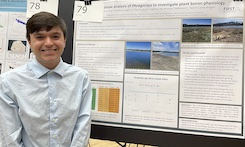 Antonio Zevola is graduating senior with a major in Biochemistry and a minor in Environmental Studies.
Antonio has done work in the FIRST Lab in the Geosciences department with Dr. Troy
Rasbury and Kathleen Wootan for the last four semesters, and has assisted with multiple
projects studying boron isotope fractionation in different plant species. After graduating
this semester, Antonio plans to combine and continue his interests in biology, chemistry,
and environmental science and begin a masters program in Ecology and Evolution, with
a focus in Ecology, in the upcoming fall semester with Dr. Elizabeth Watson here at
Stony Brook University.
Antonio Zevola is graduating senior with a major in Biochemistry and a minor in Environmental Studies.
Antonio has done work in the FIRST Lab in the Geosciences department with Dr. Troy
Rasbury and Kathleen Wootan for the last four semesters, and has assisted with multiple
projects studying boron isotope fractionation in different plant species. After graduating
this semester, Antonio plans to combine and continue his interests in biology, chemistry,
and environmental science and begin a masters program in Ecology and Evolution, with
a focus in Ecology, in the upcoming fall semester with Dr. Elizabeth Watson here at
Stony Brook University.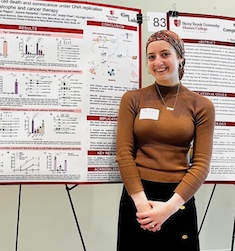 Camryn Zezelic is a Biochemistry and Psychology double major, and is a member of the Women in Science
& Engineering (WISE) honors program. Her love of research began in high school where
she worked on a project studying the social behavior of African Cichlids under Stephen
Abrams. She continued to get involved in research during her freshman year summer
at Technion University in Israel, studying mutations in the IQSEC2 gene under Dr.
Andrew P. Levy. Most recently, since the start of her sophomore year at Stony Brook,
she has been working under the guidance of Dr. Hyungjin Kim and Ph.D. candidate Jinal
Patel in the department of Pharmacology. Her research has pertained to understanding
DNA replication stress in cancer cells, with a specific focus on checkpoint activation
and the DNA-PK/CHK1 pathway. Her senior thesis project specifically involved the activation
of the protein kinase DNA-PK upon replication catastrophe in cancer cells. Her research
interests remain in cellular biology and biochemistry, and she wants to explore different
avenues of research in these fields moving forward. After completing her undergraduate
studies, she plans to apply for Ph.D. programs and continue her journey in research.
Camryn Zezelic is a Biochemistry and Psychology double major, and is a member of the Women in Science
& Engineering (WISE) honors program. Her love of research began in high school where
she worked on a project studying the social behavior of African Cichlids under Stephen
Abrams. She continued to get involved in research during her freshman year summer
at Technion University in Israel, studying mutations in the IQSEC2 gene under Dr.
Andrew P. Levy. Most recently, since the start of her sophomore year at Stony Brook,
she has been working under the guidance of Dr. Hyungjin Kim and Ph.D. candidate Jinal
Patel in the department of Pharmacology. Her research has pertained to understanding
DNA replication stress in cancer cells, with a specific focus on checkpoint activation
and the DNA-PK/CHK1 pathway. Her senior thesis project specifically involved the activation
of the protein kinase DNA-PK upon replication catastrophe in cancer cells. Her research
interests remain in cellular biology and biochemistry, and she wants to explore different
avenues of research in these fields moving forward. After completing her undergraduate
studies, she plans to apply for Ph.D. programs and continue her journey in research.
Karen. How did being involved in research enhance your education?
Gwendolyn. Getting started with my research allowed me to connect with so many others of my
peers who were doing research in the Women’s, Gender, and Sexuality Studies department.
It was so rewarding to work alongside those in different fields of study researching
with the same feminist intersectional lens. This inspired me to dig deeper intellectually
and created a motivating and supportive environment to complete my thesis especially
under the guidance of such an excellent professor.
Juhi. Being involved in research enhanced my education by allowing me to explore multidisciplinary
studies. As a biology major who wants to go into medicine, I am used to doing and
dealing with science-based research, so humanities-centered research was a way for
me to venture out of my comfort zone and explore the different analytical lenses that
linguistics has to offer. I combined my knowledge of the two fields to shape my research
approach and it was such a rewarding experience.
Gabriela. Participating in research has strengthened my diversity, equity, and inclusion (DEI)
research interests and fueled my aspiration to pursue a master’s degree. Additionally,
it has increased my confidence in my research abilities and equipped me with the readiness
for upcoming research endeavors.
Antonio. Being involved in research has given me a more thorough and hands-on education and
understanding that lectures alone cannot provide. While lectures have an important
role in
education, actually participating in research can help to show you what you actually
enjoy when
it comes to being in a lab or field setting. This has helped me greatly to decide
which specific
direction I plan to continue my research and education.
Eliana. Being involved in research has exposed me to real-world projects to which I could apply the concepts I learned throughout my coursework. It enabled me to further develop the technical, analytical, and collaborative skills that I established as an undergraduate in preparation for a career in engineering.
Karen. What's your favorite aspect of doing research?
Ying-Syun (Jenna ). My favorite aspect of doing research is that we can apply our research to address
pressing social and health-related issues, develop effective interventions to mitigate
those issues, and ultimately inform public health and policies. Doing research with
the
hopes of improving people’s psychological well-being and physical health is very exciting.
Daniel. One aspect of my research I particularly enjoyed was its hands-on nature. Due to
our need to interact with the Shinnecock, we had no traditional laboratory for our
work, and it was instead conducted at the Hunter Homes on the reservation. I enjoyed
having a physical site for the project and the opportunity to include outreach in
our projects and aspects of statistics, data analysis, and electrical engineering,
pushing and growing our skills in the process.
Camryn. My favorite aspect of doing research is definitely the “solving the mystery” part.
I enjoy thinking of the questions I want to answer, and trying to plan a way to find
that answer through experimental design. I’ve always enjoyed that creative aspect
of research, and I find that solving the unknown is the most exciting part about science.
Karen. How has doing research prepared you for your future career?
Francesca. Research has prepared me for my future career as an aspiring physician due to the experience I have gained with the ability to troubleshoot. Organic synthesis may involve trial-and-error as well as optimization given a specific reaction. Similarly, each patient is unique in their own way and what works for one patient, may not work for the next, something that I feel is extremely important to keep in mind.
Carmine. Research has definitely prepared me for my future career. In the future, I plan to become a litigator, which means I want to argue a case before a court. Presenting at URECA gave me the opportunity to refine my presentation skills, which will serve me well as an attorney!
Karen. What have you learned from your interactions with your mentor and colleagues in your lab?
Joseph. I have learned from my interactions with Dr. Pentyala and my colleagues in my lab
that having a good team is one of the most important factors to success. I genuinely
would not have enjoyed research if it weren't for Dr. Pentyala's compassion, and the
friendships I have made with my colleagues.
Karen. What advice about research do you have for other undergrads?
Carly. Research does not always need to be laboratory-based. It can take on many different
forms: in my case, it was writing a book. Choose a project where you feel that you
will make a genuine contribution and a difference in the lives of others, and your
research will feel like the fulfillment of your passion, not extra work.
Thomas. Over the past two years, I've learned that a lot of research boils down to one thing:
how you handle making mistakes. Nobody's perfect - you're gonna mess up and do things
the wrong way, but it's how you treat yourself and the others around you when you
make those mistakes that will either make or break your career. Owning up to those
mistakes and admitting when you're wrong is one of the most powerful ways to learn
about any technique you'll come across. Not only will you strengthen your skills and
master various techniques, but you'll also foster a sense of growth and resilience
within your lab community.
Fang-Yuan. When delving deeply into your research, it can be easy to lose yourself in the details
and technicalities. It is important to remind yourself of the fundamental reasons
why you are doing the research — in other words, take a step back to look at the bigger
picture. Patience and persistence are also essential for any research.
Carsi. Don’t be afraid to contact professors about getting involved in their research.
A lot of them are very open to undergraduate research. But if you don’t get responses
from professors don't be discouraged, there are many different research experiences
with other professors or programs, like VIP. A lot of research is self motivated so
make sure you’re passionate about it and that you want to put in the time and effort,
but most importantly enjoy the journey!
Michael Corcoran. Pick a topic that is interesting to you, and don’t be afraid to change your original
thesis. You will very likely find conflicting information that will challenge your
perception. Don’t be afraid of it, but incorporate it into how you approach your thinking.
That’s what makes research fun!
Mason. Research is never completed alone or in a vacuum. Rely on your peers, your advisor,
and anyone you feel you can trust as these are the people who will help you get through
the trials and tribulations you will undoubtedly face in the pursuit of knowledge.
Learn from people outside your knowledge silo and talk about how your research affects
and is affected by society and the biases which come with it. If you truly want to
enact positive change, you will have to grow into a more ethical, multidisciplinary,
and creative researcher than those who came before you.
Amy. For upcoming undergrads, my advice is to just go for it! Although it may seem intimidating
especially if you are underrepresented in the field you seek to pursue, research is
an immensely
fulfilling experience and allows you to apply knowledge from your classes in practical
contexts.
Many professors at Stony Brook are willing to train passionate undergraduate students,
regardless of prior experience. Embrace the potential of failure because research
is all about trial and error!
Jayden. My biggest piece of advice is to not be afraid to reach out to professors or apply
for new activities. Both iGEM and the VIP Program were ways that I was unexpectedly
brought into the world of research, and taking the first step to reach out and apply
was one of the best I made.
Andreas. Don't ever feel like it is too late to get involved in research. I started in Chan
lab the summer before my Senior year and since then, I have had many great experiences
and worked on multiple posters in this past year. Starting research as an upperclassman
gave me very useful background knowledge to use in my research. Additionally, my progress
was determined by my want to learn more than anything else. It is never too late!
